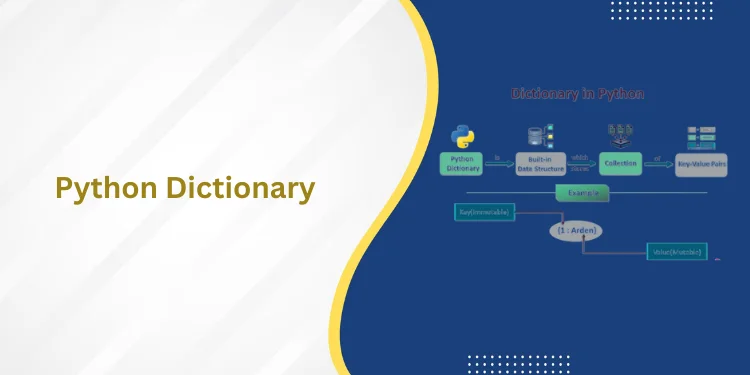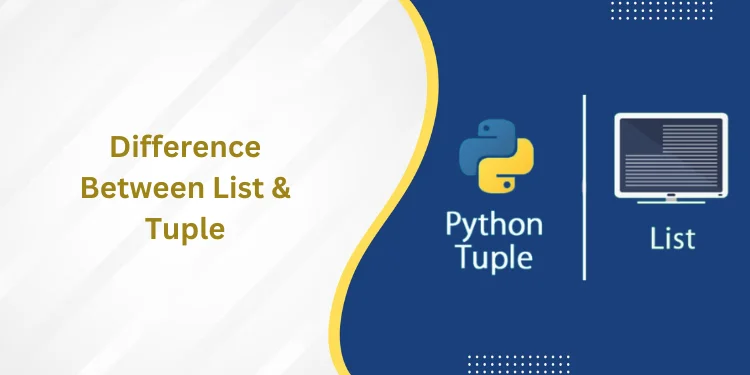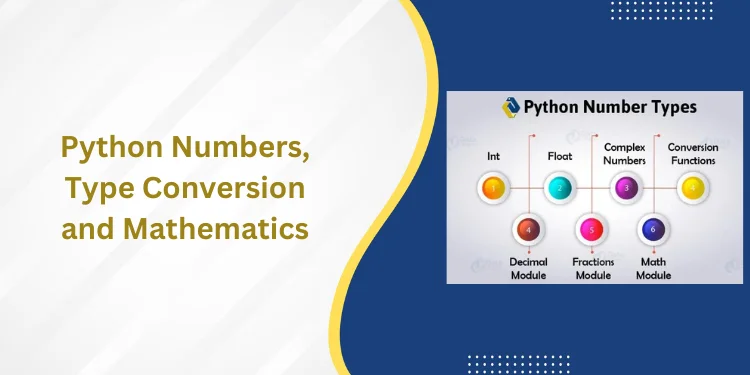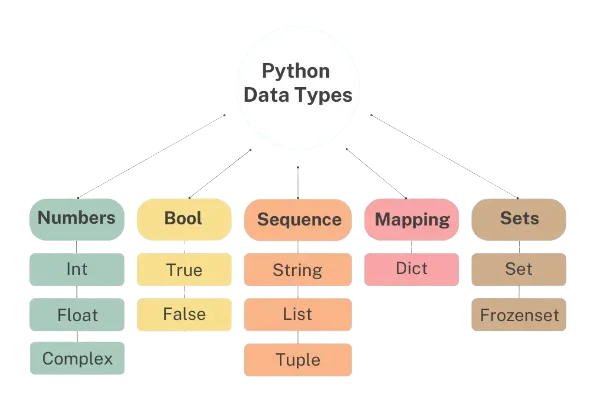Introduction to TypeScript Interview Questions and Answers
The TypeScript programming language was developed and is taken care of by Microsoft. It is a syntactical superset of JavaScript together with the inclusion of static inputting as an alternative. TypeScript is a large-scale app development language that is used to compile JavaScript. As TypeScript is a superset of JavaScript, pre-existing JavaScript software programs are also legitimate TypeScript programs. Usage of TypeScript, Microsoft’s strongly typed language based on JavaScript, has soared when compared with 6 years ago, as reported by the “2021 State of JS” survey presented on February 15.
In case you’re deciding to begin your career in Web Development and you also intend to understand the expertise associated with it, right now is the perfect moment to dive in, when technological innovation is in its blooming stage. TypeScript Interview Questions are going to provide you with an in-depth understanding and enable you to get ready for your interviews. In case you are going to a TypeScript developer job interview, here is a complete selection of the frequently asked TypeScript interview questions and answers. For more info on TypeScript, see the videos and articles additional. Now, go ahead and start looking into the numerous TypeScript interview questions.
TypeScript Basic Interview Questions for Freshers
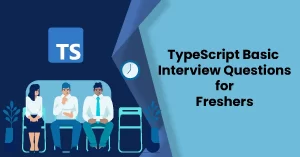
What is TypeScript?
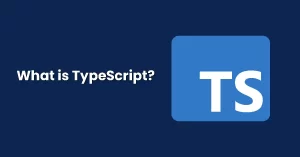
Microsoft created and manages TypeScript, an open-source and free programming language. It’s a strongly-typed JavaScript superset that compiles to plain JavaScript. It is a language for developing JavaScript applications on a large scale. TypeScript is relatively simple to learn and apply for developers who are familiar with C#, Java, and other strongly typed languages.
TypeScript can be run on any browser, any host, and any operating system. TypeScript is not directly accessible through the browser. Compiling and producing JavaScript files necessitates the use of a compiler. TypeScript is the ES6 edition of JavaScript with a few extra features. Interviewer can ask you these TypeScript interview questions to test your knowledge of TypeScript basics. It is also among the TypeScript basic interview questions. It is also among the top 10 TypeScript interview questions.
What distinguishes TypeScript from JavaScript?
|
S.No |
JavaScript |
TypeScript |
|
1. |
Netscape introduced it in 1995. |
It was created in 2012 by Anders Hejlsberg. |
|
2. |
The source file for JavaScript has the “.js” extension. |
The TypeScript source file has the extension “.ts. |
|
3. |
ES6 is not supported by JavaScript. |
ES6 is supported by TypeScript. |
|
4. |
Static typed or Strongly types are not supported. |
It supports both strongly typed and static typing. |
|
5. |
It’s simply a scripting language. |
It supports concepts from object-oriented programming such as classes, interfaces, inheritance, generics, and so on. |
|
6. |
JavaScript does not support optional parameters. |
Optional parameters are available in TypeScript. |
|
7. |
Because it is an interpreted language, errors were noted during runtime. |
During development, it compiles the code and highlights errors. |
|
8. |
Modules are not supported by JavaScript. |
Modules are supported by TypeScript. |
|
9. |
The objects in this case are a number and a string. |
Number and string are the interfaces in this case. |
|
10. |
Generics are not supported by JavaScript. |
Generics are supported by TypeScript. |
Interviewer can ask you these TypeScript interview questions to test your knowledge of distinction between JavaScript and TypeScript. It is also among the top 10 TypeScript interview questions.
Enumerate the Applications of TypeScript
- Both server-side and client-side JavaScript applications could be made with TypeScript.
- TypeScript is employed to make both server-side and client-side JavaScript applications.
- Since TypeScript provides additional features and also gives errors right away within the code, it could be used rather than JavaScript.
- TypeScript is a programming language that is employed to generate large-scale business systems.
Interviewer can ask you these TypeScript interview questions to test your knowledge of applications of TypeScript. This is also among the TypeScript tricky interview questions and TypeScript basic interview questions.
What is the Requirement of TypeScript?
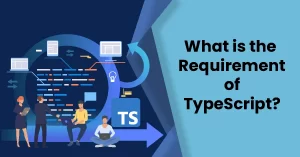
- TypeScript is quick, easy, and most significantly, really easy to understand.
- TypeScript supports object-oriented programming characteristics such as classes, generics, inheritance, interfaces, and more.
- TypeScript offers the error-checking attribute at the compilation phase. It will compile the code, and in case any error is identified, consequently, it highlights the errors prior to the script being run.
- TypeScript supports all JavaScript libraries since it’s the superset of JavaScript.
- TypeScript supports reusability by utilizing the inheritance.
- TypeScript makes app development as swift and convenient as it can be, and the tooling assistance of TypeScript provides us with source documentation, type checking, and autocompletion.
- TypeScript supports the newest JavaScript characteristics which include ECMAScript 2015.
- TypeScript offers all the positive aspects of ES6 in addition to much more efficiency.
- TypeScript supports Static typing, Optional Parameters, Modules, Strongly type, etc.
Interviewer can ask you these TypeScript interview questions to test your understanding of TypeScript and among the TypeScript basic interview questions.
Enumerate the Advantages of TypeScript
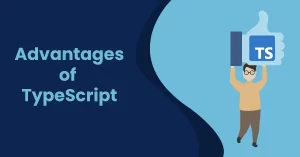
- Issues are highlighted all through development and at the compilation phase.
- TypeScript could be run in any browser or even JavaScript engine.
- A namespace notion is made by declaring a module.
- IntelliSense is a TypeScript feature that offers proactive clues as you type.
- Strongly typed or even static typing is supported. The benefit of TypeScript is that it’s solely typed or allows for static typing. Due to static typing, it could establish type correctness at the compilation phase.
Interviewer can ask you these TypeScript interview questions to test your knowledge of TypeScript advantages and among the TypeScript basic interview questions.
What are the primary features of TypeScript?
- Cross-Platform: The TypeScript compiler could be installed on any operating system like Windows, macOS, along with Linux.
- ES6 Features: TypeScript consists of most attributes of planned ECMAScript 2015 (ES6) like Arrow functions.
- Object-Oriented Language: TypeScript offers every one of the typical OOP features such as classes, interfaces, and also modules.
- Static Type-Checking: TypeScript utilizes static typing and also helps type verifying at compile time. Therefore, you can find compile-time errors while creating the code without running the script.
- Optional Static Typing: TypeScript additionally makes it possible for elective static typing in case you’re used to the dynamic typing of JavaScript.
- DOM Manipulation: You can make use of TypeScript to manipulate the DOM for adding or getting rid of client-side web page components.
Interviewer can ask you these TypeScript interview questions to test your knowledge of TypeScript features. It is also among the top 10 TypeScript interview questions.
Precisely what are the primitive types in TypeScript?
TypeScript has 3 primitive sorts that are often used: boolean, number, and string. These correspond to the in the same way named sorts in JavaScript.
- string: signifies text values for example “javascript”, “TypeScript”, and so on.
- number: signifies numeric values like 1, 2, 32, 43, etc.
- boolean: signifies a variable that could have a ‘true’ or ‘false’ value.
Interviewer can ask you these TypeScript interview questions to test your knowledge of Primitive types.
What are Type assertions within TypeScript?
Type assertion in TypeScript functions such as typecasting in various languages but with no type checking or restructuring of data possible in languages such as C# and Java. Type assertion doesn’t have an effect on runtime and is used solely by the compiler. Type assertion is basically a smooth version of typecasting that indicates the compiler sees the variable as a specific type but doesn’t push it into that mold in case it is in a distinct sort. Interviewer can ask you these TypeScript interview questions to test your knowledge of Type assertions. It is also among the top 10 TypeScript interview questions.
What exactly are the Various Elements of TypeScript?
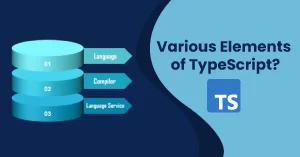
|
Language |
The language comprises components like type annotations, keywords, and new syntax, in addition to enabling us to create TypeScript. |
|
Compiler |
The TypeScript compiler is open-source, cross-platform, and is composed in TypeScript. It transforms the code created within TypeScript comparable to its JavaScript code. It runs the parsing, and type examining of our TypeScript code to JavaScript code. It can also aid in concatenating different files to a single output file and also in making source maps. |
|
Language Service |
The language service provides info that allows other tools and editors to provide far better support capabilities like automated refactoring and IntelliSense. |
Interviewer can ask you these TypeScript interview questions to test your knowledge of elements within TypeScript. This is also among the top TypeScript interview questions for experienced professionals.
Do you know the Disadvantages of TypeScript?
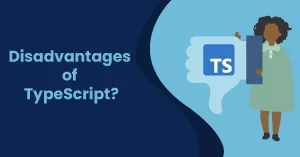
TypeScript has all of the following disadvantages:
- TypeScript takes quite a long time to compile the code.
- It doesn’t support abstract classes.
- When we operate the TypeScript application program in the browser, a compilation action is necessary to change TypeScript into JavaScript.
- Web developers are utilizing JavaScript for many years and TypeScript does not bring anything new.
- To make use of any third-party library, the definition file is a necessity.
- The quality of type definition files is an issue.
Interviewer can ask you these TypeScript interview questions to test your knowledge of disadvantages of TypeScript. This is also among the TypeScript tricky interview questions.
TypesScript Interview Questions Intermediate Level

Who created TypeScript and what is the present stable edition offered?
Anders Hejlsberg created TypeScript. Furthermore, he is among the central participants of the development team of C# language. The TypeScript was initially launched in the month of October 1st, 2012, and also was marked edition 0.8. Nevertheless, it’s created and also looked after by Microsoft within the Apache 2 license. It was developed for the enhancement of a huge application.
The present stable version of TypeScript is 3.2 which was released on September 30, 2018. TypeScript compiles easy JavaScript code that operates on any kind of browser that supports the ECMAScript 2015 framework. Additionally, it provides support for the latest and evolving JavaScript characteristics. Interviewer can ask you these TypeScript interview questions to test your knowledge of the latest trends of TypeScript. This is also among the top TypeScript interview questions for experienced professionals.
Enumerate the built-in data types in TypeScript.
In TypeScript, the built-in data types also are referred to as primitive data types and the list includes:
|
Number |
This signifies number type values. The numbers are saved as floating-point values in TypeScript. |
|
String |
A string symbolizes a sequence of characters saved as Unicode UTF-16 code. |
|
Boolean |
This symbolizes a logical value. Whenever we are using the Boolean type, we receive the output solely in false or true. |
|
Null |
Null symbolizes a variable whose value is undefined. It’s out of the question to directly reference the null type value itself. |
|
Undefined |
All uninitialized variables are represented by the Undefined type. |
|
Void |
A void is the return type of the features that don’t return any sort of value. |
Interviewer can ask you these TypeScript interview questions to test your knowledge of built-in data types. This is also among the TypeScript tricky interview questions.
Explain Loops in TypeScript
A loop statement makes it possible to repeat the execution of a series or a statement of statements. To deal with looping needs, TypeScript has a number of loops.
|
For Loop |
The for loop is a certain loop implementation. A definite loop is determined as a loop having a fixed number of iterations. |
|
While Loop |
When the condition supplied evaluates to true, the while loop executes the steps. |
|
Do..While Loop |
The do…while loop is the same as the while loop, apart from that the condition is not evaluated the initial time the loop runs. |
Interviewer can ask you these TypeScript interview questions to test your knowledge of loops. This is also among the top TypeScript interview questions for experienced professionals.
Precisely what are the access modifiers supported by TypeScript?
TypeScript supports access modifiers public, private, along with protected which in turn figure out the accessibility of a class member as provided below:
- Public: Every one of the members of the class, its child classes, and the instance of the class can have access to it.
- Protected: All the members of the class and its child classes can use them. But the instance of the class can’t be accessed.
- Private: Just the members of the class can have access to them.
In case an access modifier is not really specified it’s implicitly public as that complements the handy nature of JavaScript. Interviewer can ask you these TypeScript interview questions to test your knowledge of access modifiers. This is also among the top TypeScript interview questions for experienced professionals.
What are the minimum specifications for installing TypeScript? Or perhaps precisely how could we obtain TypeScript and install it?
TypeScript can be set up and also handled with the assistance of node through npm (the Node.js package manager). To install TypeScript, first, make certain that the npm is installed appropriately, then run the succeeding command which installs TypeScript globally on the system.
$ npm install -g TypeScript
It installs a command-line code “tsc” that is in addition be utilized to compile the TypeScript code. Ensure that we examine the version of TypeScript installed on the system. The following steps are involved in installing TypeScript:
- Download and run the msi installer of the node.
- To see if the installation was successful, run the command “node -v.”
- Type command in terminal window for installing TypeScript:
TypeScript: $ npm install -g TypeScript
Interviewer can ask you these TypeScript interview questions to test your knowledge of TypeScript requirements. This is among the TypeScript interview questions for 5 years experience or more and TypeScript coding interview questions.
How can you compile TypeScript files?
The extension for almost any TypeScript file is .ts. Plus any JavaScript file is a TypeScript file as it’s a superset of JavaScript. Thus, as soon as you modify the extension of “.js” to “.ts”, your TypeScript file is ready. In order to compile some .ts files into .js make use of the following command:
tsc
For instance, to compile “varunyadav.ts”
tsc varunyadav.ts
And the outcome will be varunyadav.js
Interviewer can ask you these TypeScript interview questions to test your understanding of TypeScript specifications. This is also among the TypeScript tricky interview questions and TypeScript coding interview questions.
What exactly are decorators, and what could they be utilized to?
A decorator is a specific sort of declaration that allows you to modify classes or class members all at one time by marking them with the annotation. Each decorator must relate to a characteristic that’ll be evaluated for runtime. For instance, the decorator sealed would match to the sealed function. Whatever is marked with sealed could be employed to assess the sealed function.
function sealed(target) {
// do something with ‘target’ …
}
They may be connected to:
- Class declarations
- Methods
- Accessors
- Properties
- Parameters
Decorators aren’t allowed by default. In order to allow them, you’ve to edit the experimentalDecorators field in the compiler options from your tsconfig.json file or the command line. Interviewer can ask you these TypeScript interview questions to test your knowledge of decorators.
What are Recursive Type Aliases?
The capability to “recursively” reference type aliases has invariably been restricted. The reason behind this is that every type of alias should be effective at replacing itself no matter what it aliases. Simply because this is not often achievable, the compiler rejected several recursive aliases.
Interfaces could be recursive, but their expressiveness is constrained, and type aliases can’t. This entails incorporating the two: developing a type alias along with removing the type’s recursive parts into interfaces. It is efficient.
type ValueOrArray = T | ArrayOfValueOrArray;
interface ArrayOfValueOrArray extends Array<ValueOrArray> {}
Interviewer can ask you these TypeScript interview questions to test your knowledge of recursive type aliases. This is among the TypeScript interview questions for 5 years experience or more and TypeScript coding interview questions.
What is the Scope variable?
The scope is a set of objects, variables, and functions, and the JavaScript can have a global scope variable and a local scope variable. You can declare a variable in 2 distinct scopes such as:
- Local Scope Variable: It’s a function object which is employed within the functions
- Global Scope Variable: You can make use of this particular window object from function and within the functions.
Interviewer can ask you these TypeScript interview questions to evaluate your understanding of scope variables. It is also among the top 10 TypeScript interview questions.
TypeScript Interview Questions Advanced Level
Enumerate several of the utility types offered by TypeScript and explain their usage.
TypeScript offers several utility types that make common type transformations easy. These utility types can be found globally. Listed here are several of the crucial utility types incorporated in TypeScript.
|
Utility Type |
Description |
|
Partial |
Constructs a type with all attributes of Type set to optional. |
|
Required |
Constructs a type comprising all the Type set required. |
|
Readonly |
Constructs a type with all of the attributes of Type set to readonly. |
|
Record |
Constructs an object type with property keys are of type Keys, and values are Type. |
Interviewer can ask you these TypeScript interview questions to evaluate your understanding of utility types. It is also among the top 10 TypeScript interview questions.
What are Arrow/lambda functions in TypeScript?
The fat arrow function is a shorthand syntax for determining function expressions of anonymous functions. It is similar to lambda functions in different languages. The arrow function allows you to ignore the function keyword and create more concise code. Interviewer can ask you these TypeScript interview questions to evaluate your understanding of Arrow/lambda functions. It is also among the top 10 TypeScript interview questions.
What scopes are available in TypeScript? Just how can this compare to JS?
|
Global Scope |
Defined exterior of any class and could be employed anywhere in the program. |
|
Function/Class Scope |
Variables determined in a function or class could be employed at any place within that range. |
|
Local Scope/Code Block |
Variables determined in the local scope could be used anywhere in this block. |
Interviewer can ask you these TypeScript interview questions to evaluate your understanding of scopes.
How can you attain function overloading in TypeScript?
To overload a function in TypeScript, just make 2 functions of the exact same name but have distinct argument/return types. Both functions need to accept the exact no. of arguments. This is a vital component of polymorphism in TypeScript. For instance, you can make an add function that sums the 2 arguments in case they are numbers and concatenates them in case they are strings.
function add(a:string, b:string):string;
function add(a:number, b:number): number;
function add(a: any, b:any): any {
return a + b;
}
add(“Hello “, “Varun”); // returns “Hello Varun”
add(10, 20); // returns 30
Interviewer can ask you these TypeScript interview questions to evaluate your understanding of function overloading in TypeScript. This is also among the advanced TypeScript interview questions and TypeScript coding interview questions.
What exactly does the Omit type do?
Omit is a form of utility type, which facilitates frequent type transformations. Omit enables you to establish a type by passing a present Type and choosing Keys to be omitted in the new type.
Omit<Type, Keys>
For example:
interface Todo {
title: string;
description: string;
completed: boolean;
createdAt: number;
}
type TodoPreview = Omit<Todo, “description”>;
Interviewer can ask you these TypeScript interview questions to evaluate your understanding of omit type. This is among the TypeScript interview questions for 5 years experience or more.
What are Triple-Slash Directives? What exactly are some of the triple-slash directives?
Triple-slash Directives are single-line comments that contain an XML tag to make use of as compiler directives. Each directive indicates what to load during the compilation process. Triple-slash Directives only perform at the top of their file and will be viewed as regular responses elsewhere in the file.
/// path=”…” /> is probably the most common directive and also describes the dependency among files.
/// types=”…” /> is comparable to path but describes a dependency for a package.
/// lib=”…” /> enables you to explicitly add the built-in lib file.
Interviewer can ask you these TypeScript interview questions to evaluate your understanding of triple slash directives. This is also among the advanced TypeScript interview questions.
What exactly are Mixins?
In Javascript, Mixins are a method of creating classes from reusable elements and then making them by integrating simpler partial classes. The thought is rather simple, rather than a class A extending class B to get its functionality, characteristic B usually takes class A and returns a new class with these extra features. At this point, function B is a mixin. Interviewer can ask you these TypeScript interview questions to evaluate your understanding of mixins. This is also among the advanced TypeScript interview questions.
Explain exactly how TypeScript files could be supported from Node Modules
TypeScript consists of a number of declaration files to make sure that JavaScript and TypeScript support works great right out of the box (.d.ts files). The different APIs in the JavaScript language, in addition to the regular browser DOM APIs, are represented in these declaration files. While there are several fair defaults according to your target, you can configure the lib setting within the tsconfig.json to indicate what declaration files your program uses.
TypeScript has an element similar to types/ support that enables you to override a certain built-in lib. TypeScript is going to check for a scoped TypeScript/lib-* package in node modules when choosing which lib files to include. Next, you can use your package manager to install a certain package to take over a certain library. Interviewer can ask you these TypeScript interview questions to evaluate your understanding of TypeScript specifications. This is also among the advanced TypeScript interview questions.
What are the Latest Advancements in TypeScript?
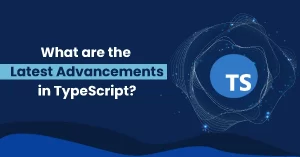
TypeScript 4.2 has been released, and it provides a lot more flexible type annotations, harder inspections, and extra configuration options, in addition to a few breaking changes. Rest arguments could now be put anyplace in a triple type. In type error messages, type aliases are no longer enlarged, leading to far better developer expertise. TypeScript 4.2 brings the language a step closer to its objective of precisely typing JavaScript at any size, anywhere JavaScript is utilized. Interviewer can ask you these TypeScript interview questions to evaluate your understanding of TypeScript trends.
What do you comprehend by classes in TypeScript? List a few characteristics of classes.
We understand that TypeScript is a kind of Object-Oriented JavaScript language and also supports OOPs programming characteristics such as classes, interfaces, and more. Like Java, classes are the basic entities that are used to make reusable components. It’s a group of objects which have standard properties. A class is a template or perhaps a plan for making objects. It’s a logical entity. The “class” keyword is utilized to declare a class in TypeScript.
Conclusion to TypeScript Interview Questions
TypeScript has been rising in reputation for the last several years, and numerous significant businesses and well-known frameworks have embraced TypeScript to handle their huge JavaScript codebases. It is a useful ability to have as a developer. Through this post, we explored the questions that a developer could possibly get asked in a job interview.
We’ve included user-friendly code illustrations to cement the basics even more. We Hope these TypeScript Interview Questions are going to help you in your interviews. In the event you’ve been to an interview in the recent past, do post the interview questions within the comments section and we will respond to them
. You can likewise comment below in case you’ve any queries in your mind, which you may confront in your TypeScript interview questions. You can also check out our other blogs Recursion in Data Structure, Data Mining Algorithms, Supply Chain Management Interview Questions and many more!
Frequently Asked Questions
1. What is double question mark in TypeScript?
The double question marks (??) are usually referred to as nullish coalescing operators and they enable the use of a default value set on the right side of the operator in the event the original value from the left side of this operator is undefined or null. To make things much easier, let us look at a great example.
let random;
const color = random ?? ‘red’;
In this example, we’ve 2 variables: random and color. The random variable is undefined. Consequently, at the instant of declaring and setting the value to the color variable, it is going to default to “red”. Let’s move on to the next faq for TypeScript interview questions.
2. Is TypeScript front end or backend?
The realm of frontend applications is a natural fit for TypeScript. TypeScript provides structure and safety to your application by supporting JSX and correctly modeling mutability. It also makes it easier to produce correct, maintainable code in the fast-paced environment of frontend development. Let’s move on to the next faq for TypeScript interview questions.
3. What are the primitive types in TypeScript?
Number, string, boolean, bigint, symbol, undefined, and null are the seven primitive types supported by TypeScript. In TypeScript, all other data types are objects. A primitive data type is one that isn’t an object and doesn’t have any methods. Immutability applies to all primitives. Let’s move on to the next faq for TypeScript interview questions.
4. Does TypeScript have inheritance?
Inheritance is a key feature of object-oriented programming languages, and it’s used to make a new class out of an existing one. The Derived class is the newly generated class, and the Base class is the class from which the Derived class inherits. An inherited derived class inherits the base class’s properties and behaviors.
TypeScript allows for both single and multilevel inheritance. We can’t use TypeScript to implement hybrid and many inheritances. The inheritance is based on classes, and it may be done in TypeScript using the extended keywords. Let’s move on to the next faq for TypeScript interview questions.
5. What is operator in TypeScript?
A symbol that operates on a value or data is known as an operator. It denotes a certain data manipulation action. The operand is the data on which operators work. To produce a single value, it can be used with one or more values. The TypeScript program includes all of the usual JavaScript operators. Let’s move on to the next faq for TypeScript interview questions.
6. Is TypeScript easy to learn?
TypeScript is a little more difficult to understand than JavaScript. This is because TypeScript is built on top of JavaScript, so you’ll need to know how JavaScript works first. However, with a little effort and patience, you should be able to pick up TypeScript in no time. There are several features in TypeScript that aren’t available in JavaScript. Decorators, access modifiers, enums, static typing, and interfaces are examples of these. Prepare to invest time learning about entirely new topics in web development that you may have never encountered before. Let’s move on to the next faq for TypeScript interview questions.
7. Does Google use TypeScript?
Brad Green, Google’s Engineering Director, announced during ng-conf 2017 that TypeScript is officially an official Google language. For developers wondering about Dart status, he highlighted that both Dart and TypeScript will be in the same category.
Google uses TypeScript and Angular on TypeScript for a variety of products, including Google Analytics, Firebase, and Google Cloud Platform, along with internal features like bug monitoring, employee reviews, and product clearance and launch tools. Let’s move on to the next faq for TypeScript interview questions.
8. What is never type in TypeScript?
Never is a new type in TypeScript that denotes values that would never be encountered. When you are certain that something will never happen, you use the never type. For example, suppose you write a function that never returns or always throws an exception. Let’s move on to the next faq for TypeScript interview questions.
9. What is strong typing in TypeScript?
TypeScript is strongly typed, which means that the programmer can define variables and other data structures to be of a specified type, such as a string or a boolean, and TypeScript will validate their values. This is not possible with JavaScript because it is a loosely typed language.
Strong typing in TypeScript allows for a range of features that help developers be more productive, especially when working with big, enterprise-scale codebases. Because TypeScript is compiled instead of interpreted like JavaScript, errors can be identified before they are executed; IDEs that conduct background incremental compilation can detect such issues while coding. Let’s move on to the next faq for TypeScript interview questions.
10. What is triple dot in TypeScript?
It’s either rest parameters or perhaps the spread operator when we see three dots (…) in the code. It’s simple to tell the difference between them:
- It’s “rest parameters” when three dots (…) appear at the end of a function parameter list, and it gathers the remainder of the list of arguments into an array.
- The “spread operator” expands an array into a list when three dots (…) appear in a function call or similar.
This is also among the advanced TypeScript interview questions.





